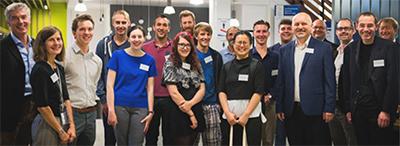Initial experiences of creating and delivering degree apprenticeships at the University of Exeter

Professor Timothy Quine, Deputy Vice-Chancellor (Education), University of Exeter, addressing the Westminster Employment Forum Keynote Seminar: The future for higher and degree apprenticeships – expansion, integration and standards
I want to convey some of our enthusiasm, as a Russell Group research intensive university, for degree apprenticeships and I think that’s not necessarily a given that Russell Group universities are interested in this domain.
We see it as a really powerful innovative new approach to education that meets the skills needs, can contribute to meeting the skills needs of the country. I’m going to try and persuade you that it also aligns very closely with our overall strategy.

We have three pillars of our strategy to make the exceptional happen:
- Building research power,
- Delivering intentionally excellent education, and
- Creating an impact regionally, nationally and globally
I’m going to walk you through the way I think that what we are doing around degree apprenticeships contributes to each of these pillars.
Our initial experience is based on the development in partnership with the Tech partnership of our Digital and Technology Solutions BSc programme that’s just received its second cohort of students.
Our more recent partnership with Laing O’Rourke to create a BEng in Civil Engineering with Site Management and being part of the steering group of the HE Trailblazer.
That’s quite a different perspective because that’s going in as an employer trying to work out how we can use the apprenticeship model to support the development of our staff as they seek to fulfil the requirements of REF, of TEF, and now of KEF, so we have an abundance of things that we are looking to our academic partners to undertake.
Let’s zoom in a little bit on the BSc in Digital and Technology Solutions, I think it’s really significant that the development of this programme was championed within the university by our Innovation Impact and Business Directorate, and that really gives you a flavour of one of the key reasons that we think these degree apprenticeships are vital because they’re a glue and a conduit between us and business.
It’s certainly enriched our relationship with many of our business and industrial partners, the process of designing the programme in the first instance involved workshops with 700 different businesses, in depth conversations with 50 key players in the digital technology domain.
It involved workshops on campus getting into the detail of what the first pioneer partners were looking for from us in terms of the design of the programme, and these were all enriching conversations, normally about the nature of this particular programme, but obviously the spin-out conversations take place about our wider partnership with industries.
That initial piece added some of the glue and some of the lubrication of the relationship with businesses, but clearly the continuing relationship with our partners who are delivering the apprenticeships is another area in which we have that strengthening potential for collaboration that spins out into our research domain.
Similarly, I guess, success breeds success and it’s not very surprising then that our second degree apprenticeship which I’ve mentioned, the BSc in Civil Engineering and Site Management was developed within the same academic college within the university, so Engineering, Maths and Physical Sciences. They could see the strength of the developing digital technology solutions programme, and again our Innovation Impact and Business Directorate saw potential for us to strengthen our links with Laing O’Rourke and their Hinkley Point C partners, BYLOR and EDF.
Thinking about our place in the region as well, the natural development of the relationship with what was going on, or what’s developing at Hinkley Point is a key element.
Katie McLean of Laing O’Rourke said: “Hinkley Point C will be a hugely innovative and cutting edge project for all partners, a project of this stature provides the perfect platform to help develop talent and a unique and exciting learning environment. We’re delighted to be partnering with such a prestigious institution as the University of Exeter in this exciting endeavour”.
They are seeing it in the same way, they are seeing it as really built round that particular push around the huge Hinkley Point programme.
That’s the first pillar I would suggest, is that as we’re seeking to build research power to tackle global challenges, strengthening our relationship with industry and business is key, and degree apprenticeships are part of the way that we strengthen that relationship.
The second theme I want to just pick up is around regional and local impact.
A lot of you probably think of the South West as a place that’s a lovely place to go on holiday, I understand the M5 has some of the worst traffic jams, and it was reported on the news this morning and that was put in the context, you’ve probably been there on holiday, you know, as if that’s all that happens in the South West. But it’s a place of real poverty as well.

The map here is HEFCE’s participation in higher education, those of you who know your geography will be able to see Exeter is just above the key to the left and we’ve got a ring of low participation wards within the city of Exeter. We’ve got large areas of low participation in higher education in the surrounding region. So we are determined that when we are thinking about our global reputation we are also working to ensure that we are delivering for our local community.
In partnership, with Exeter Maths School, Ted Wragg Multi-Academy Trusts, Exeter College and the LEP and city council, we are developing what we are calling a Digital Skills Escalator. The idea being that we are supporting young people from school, right the way through FE, HE, and into a research domain, to develop the digital skills that the new economy requires.
We are also looking at the idea of being a vortex institution, we are looking to spin-out digital skills innovation from our research expertise in that domain to attract other high skills employers into the region, and through our Digital Skills Escalator to be able to meet their skills demands.
Developing this, the Digital and Technology Solutions Degree Apprenticeship, fits within our vision of what we are trying to do in the city and the region, and when we think about the national shortage and the global shortage of individuals with these sorts of digital skills, then we can see that impact reaching further than just our local work.

These are degree programmes and so here’s the first cohort of students on the BSc Digital and Technology Solutions programme with 9 students, so you’ve got staff on the picture as well, and I think there are two elements to what this is challenging us around education.
The first is the new opportunities we’ve heard already, a new opportunity to learn and earn at the same time, so we really hope this is going to attract students who might not have considered higher education, those students who are worried by both the fee environment but also obviously the lack of maintenance grants and the implications that has for the most disadvantaged.
There’s a real opportunity here and obviously online learning provides an opportunity to pursue those sorts of things, but you don’t have the sort of cohort cohesion in an online learning model.
The blended approach that we are taking with a combination of residentials, with eLearning projects, with real world projects, with an academic mentor is creating quite an interesting and new approach to 21st century learning and teaching, and I think for us it’s providing new opportunities for students but it’s also challenging us to think about the way that we are delivering education.
My domain in the strategy group is obviously the right delivery of an international excellent education and I see those twin benefits, new opportunities for students which is potentially creating new students for those opportunities, but also encouraging us to think about innovation in a learning and teaching space.
That it’s why degree apprenticeships makes perfect sense for us strategically, because it is addressing all those key pillars within our strategy.
Some thoughts briefly on what it means in terms of how we got to that position:
It has required significant investment in terms of resources, and people and knowledge. The Digital Technology Solutions programme is very focused on delivering the skills that are needed right this minute. It doesn’t necessarily play to the skills of academics who are working at the research frontier, so we have appointed academics to lead on this programme who wouldn’t necessarily fit the normal education research REF submission academic who Exeter would normally look to.
It’s making us think about the diversification of our academic community.
It’s critical that it has senior management buy-in, and Sir Steve Smith, our Vice Chancellor, has been a passionate advocate that we should really push in this, so obviously having that leadership right from the top makes a big difference. I lead the steering group that does all the work around degree apprenticeships, so we maintain that close connection to the executive group, but it’s been equally critical that we’ve had the buy-in from the college at all levels across the academic community.
In terms of cross university working, I’ve already mentioned IIB, we’ve also have close work with education, with quality assurance with admissions.
In terms of expansion opportunities, you can see that we are looking to achieve further expansion on a number of domains. We want to be responsive, we want to support our staff.
I guess my final comment would just be in the context of the continuing debate around “Who should pay for high quality higher education?”.
It seems to me there are three contenders:
- There is Government,
- There are students, and
- There are employers
We spend a long time at the moment debating whether it should be Government or students, I think degree apprenticeships provide us with a pilot of a third way of approaching it, not a replacement, but one that we might think about expanding more widely.
Professor Timothy Quine, Deputy Vice-Chancellor (Education), University of Exeter
Questions and Answers Session
Jane Mackay, a PhD student from the University of Bath, asked: “You mentioned social mobility and widening participation, we’ve got lots of rules and policies in place in higher education to ensure that the applicants have contextual offers and things like that. How can you make sure employers are on the same page?”
Professor Timothy Quine responded: “Yes, well certainly with our conversations with employers they’ve equally got a strong commitment to social mobility. So it hasn’t been a problem getting them on the same page. We share the same commitment to trying to ensure that we attract students to the programme from disadvantaged areas or underrepresented groups, but at a fairly fundamental level you’ve just got to find a student who both fits the academic qualities of the programme and fits the employers’ needs.”
Alexandra Simpson, Felsted School, asked: “As far as the entry is concerned, it’s not necessarily aimed at those that would struggle entry to university by the traditional route?”
Professor Timothy Quine responded: “No, so the starting point is the same academic requirement, this is a partnership with an employer, so the employers set quite high hurdles, we set academic hurdles. We know that the academic hurdles that we place in front of students to determine their attainment or their progression to higher education are one measure of ability to succeed in higher education, but they are not fool proof, we know internally that there isn’t a strong relationship between prior attainment and success at university.”
Gillian Keegan MP, continued: “I feel the need to jump in at this point because I think understanding social mobility and perhaps the opportunity there. Unless you’ve been to a really failing comprehensive school in an area that’s very deprived, maybe you don’t get it, but the reality is there is so much talent in those schools that absolutely just goes wasted, decade after decade, and having done the whole comprehensive system and still being in touch with my school friends 30 years later, they’ve all done okay, but the talent that goes wasted, and what it is, is trying to unearth that and provide those children with a route to be enabled to be as brilliant as they can be.”
John Robertson, Gen2 Training, asked: “Could you say a little bit about how you’re approaching the end point assessment, and in particular how you ensure the necessary level of independence?”
Professor Timothy Quine responded: “It is requiring us to innovate an assessment which is a good thing in its own right and it’s really a mix of individual portfolios, reflective pieces, but clearly independent work which is facilitated by the academic mentor and by access to the virtual learning environment. So it’s not difficult to identify an independent piece of work.
Despite best endeavours to ensure accuracy, text based on transcription may contain errors which could alter the intended meaning of any portion of the reported content. Speakers have not had the opportunity for any corrections.

Responses